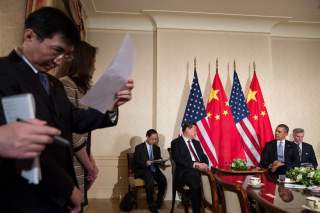Rising Eagle, Slumping Dragon?: Asia's Shifting Balance of Power on Display at APEC Summit
Compared with the circumstances facing Obama five years ago, when China was seen as a sure bet as the superpower of the future, he may be in a stronger position today than Mr. Xi is in winning the minds of his fellow APEC summiteers.
When President Barack Obama visited Beijing five years ago, China had a weak leader, but a thriving economy. By contrast, President Obama, then viewed as a transformative leader, was riding a wave of goodwill and his party had the control of Congress. But the United States was in the middle of its worst economic slump since the Great Depression and, in the minds of many Chinese leaders, a superpower in inexorable decline.
As President Obama lands in Beijing for the annual APEC summit next week, he will find a complete reversal of national fortune between the United States and China in the intervening years. The U.S. economy has undergone a painful restructuring and an energy revolution and is now considered the brightest spot in an otherwise gloomy global economic landscape. But his own political stock has greatly depreciated. His popularity is at record low and his domestic agenda, blocked by the Republicans, seems doomed.
The situation in China is just the opposite. Its economic growth has fallen steadily since 2010 and serious troubles, such as massive overcapacity, a real-estate crash, and dangerously high debt levels, are lurking ahead. Fissures have opened up among its top ruling elites. In the last three years, the party’s biggest purge since Tiananmen claimed three senior leaders—a sitting Politburo member, one retired Politburo Standing Committee member, and one retired vice chairman of the Central Military Commission. But the man who took over the Chinese Communist Party’s leadership two years ago—Xi Jinping—is indisputably a strong leader and, in contrast to Obama, seems to face little domestic opposition, at least for now, in carrying out his ambitious agenda of turning China into a self-disciplined, one-party state ruled with an iron fist.
So when Xi meets Obama, this unusual mismatch in the balance of power and leadership strength will unlikely help lift the current U.S.-Chinese relations from the doldrums. The Chinese side would see little upside in trying to reach important agreements (not that there are any on the table) with a gravely weakened occupant of the White House. The American side would also be cautious in embracing a leader who, for all his political strength, has projected a vision it finds deeply unsettling.
(You Might Also Like: Engagement and Assurance: Debating the U.S.-Chinese Relationship)
Thus, while we may not go so far as to say that Obama and Xi have written each other off and will engage mostly in ceremonial small talk in Beijing, it is a safer bet that their more important objective is to communicate their own messages to the other attendees of the Beijing APEC summit.
For Xi, the message is simple and clear. As the host of the Beijing APEC summit, he wants to convey to the region’s leaders that a new order now prevails in China and his ambitious plan of sustaining a one-party state by fighting corruption, imposing strict political controls and reviving economic reform will work. While his audience will be impressed by his wide-ranging domestic agenda, their concerns about Xi’s assertive foreign policy, especially on maritime and territorial disputes with its neighbors, will unlikely be assuaged. Since the APEC is primarily focused on economic issues, Xi may have a particularly hard time convincing his fellow summiteers that the Chinese economy is not in irreversible decline and that his plan for resurrecting pro-market reforms is on track, despite the fact that few of the reform measures announced a year ago at the party’s Central Committee plenum have actually been implemented.
(You Might Also Like: Can China Rise Peacefully?)
Counterintuitively, President Obama actually should have an easier time to get his central message across—“America is back.” Of course, the United States has never really left the Asia-Pacific. But the “America is back” message has two new meanings. One is, obviously, the resurgence of the U.S. economy and American power. Since diplomacy is as much about perception as about the reality of power, demolishing the lingering myth of American decline will materially advance the U.S. interests of maintaining Asia’s regional balance of power and stability. President Obama should have little difficulty this time in getting this message across.
The other meaning of “America is back” is the return of America’s national-security focus to the Asia-Pacific. President Obama will face a more skeptical audience in delivering this message. In addition to his own political weakness in Washington, President Obama is hampered by foreign-policy emergencies elsewhere, particularly the Russia-Ukraine standoff and the rise of the ISIS in the Middle East. American allies and friends in the region are worried whether the much-vaunted American “pivot to Asia” will be merely rhetorical since Washington cannot walk and chew at the same time.
However, compared with the circumstances facing President Obama five years ago, when China was seen as a sure bet as the superpower of the future, he may be in a stronger position today than Mr. Xi in winning the minds of his fellow APEC summiteers. After all, competition among nations is not a horse race. In horse races, we bet on horses. In the race among nations, we bet less on their leaders than on the underlying strengths of their political, economic and social institutions. That’s why those who bet against the United States usually lose. Even with his plummeting political fortune, President Obama will still be the star attraction at the Beijing APEC summit.
Minxin Pei is the Tom and Margot Pritzker ’72 Professor of Government at Claremont McKenna College and a non-resident senior fellow of the German Marshall Fund of the United States.

